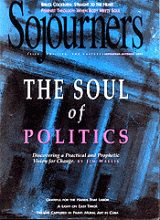Imagine the situation if Jimmy Carter had not gone to North Korea this summer, and if Kim Il Sungs death had come in the midst of a still-escalating crisis. Would the growing tension have led to war?
Well never know, of course, how profoundly Carters visit changed the course of history, and it is far too early to tell if Kims successor will defuse or escalate the crisis. But the response to the ex-presidents personal peacemaking gives us an extraordinary window into the struggle for the soul of American foreign policywhich, in the context of Clintons weathervane approach to international affairs, is seemingly up for grabs.
Critics described Carters visit to Pyongyang as "appeasement" (The New Republic), "capitulation" (Charles Krauthammer), or an "embarrassment" that served only to "induce yet another American retreat" (Henry Kissinger) and called for punitive sanctions, economic isolation, and even military strikes against the last communist holdout. In contrast, the response from the region was a collective sigh of relief as tensions eased in the wake of Carters visit; one Western diplomat in the area said that "the whole diplomatic terrain out here just shifted."
The contrast in responses illustrates the vastly different interpretations of what was at stake. Some defined the issue narrowly in terms of nuclear proliferation, and focused almost solely on how to stop the North Korea bomb. Others, especially those most closely affected, took a broader viewwith 1.5 million soldiers staring each other down across the 38th parallel, prevention of the Korean War Part II and the building of trust between the two nations were key.
Read the Full Article
